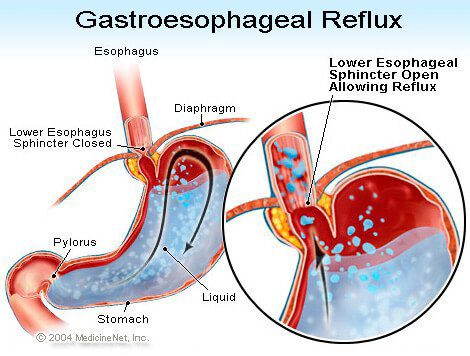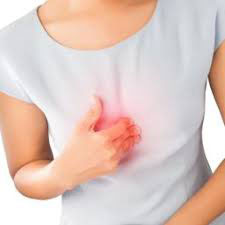Laparscopic Surgery for Gastro Esophageal Reflux Disease
What is GER?
Gastro-Esophageal Reflux (GER) is a disease in which stomach contents whatever you intake come back up into your esophagus. Stomach acid may touch the esophagus wall or may create burning sensation.
Gastro- Esophageal Reflux (GER) is also called acid digestion, acid reflux, acid regurgitation, heartburn, reflux etc. It is the common disease among general population.
What is GERD?
Gastro-Esophageal Reflux Disease (GERD) is more serious and extended form of GER which stays for the long term. GERD affects almost 20% of the population. If GER occurs more than twice a week, it is called GERD and can be serious so one should consult the doctor immediately.

Who is more likely to have GERD?
Anyone can have the symptoms of GERD for known or unknown reasons. You may have GERD if you are:-
- Obese or overweighted
- Pregnant
- Taking certain medicine causing GERD
- Chain Smoker
Complications of GERD?
If not treated well, GERD patients may have the complications:-
- Esophagitis: is an inflammation of the esophagus. Adults having Esophagitis for long may have precancerous changes
- Esophageal stricture: When esophagus become too narrow to swallow anything
- Respiratory problems: While breathing stomach acid may enter into your lungs which may cause throat & lungs irritation and may create respiratory problems such as Asthma, Chest Congestion, Sore throat, Dry & Long lasting cough, hoarseness (partial loss of voice), laryngitis (swelling in voice box), pneumonia (infection in lungs), wheezing (sharp whistling while breathing)
- Barrett's Esophagus: Very few may suffer through the deadly type of esophagus cancer. So to prevent such serious complications, it is advisable to consult the doctor immediately

Symptoms of GER & GERD:-
In case of having Gastro- Esophageal Reflux (GER), You may taste food or stomach acid in the back of your mouth. The most symptoms of GERD are as follows:-
- Bad breath
- Nausea
- Regular Heartburn
- Painful & burning feeling in chest, Breastbone back & upper/middle abdomen
- Problems in swallowing
- Respiratory problems
Vomiting
GERD Symptoms may come from the complications as mentioned above which may seriously affect the lungs
Causes of GER & GERD:-
GER or GERD happens when lower esophageal sphincter becomes weak or relaxes due to the following reasons such as:-
- Increased pressure on abdomen due to obesity to pregnancy
- Certain medicines
- Calcium channel blockers -which treat the high blood pressure
- Antihistamines -that treat allergy symptoms
- Painkillers
- Sedatives -which helps you to sleep
- Antidepressants - that treat depression
- Smoking, or inhaling secondhand smoke
A hiatal hernia may also cause pressure in the esophageal sphincter
When to See the Doctor
If you are facing such symptoms mentioned above and not get better even after taking over-the-counter medications and changed diets, You must call the doctor if you are facing other symptoms like:-
- Vomit large amounts
- Regular projectile or forceful vomiting
- Vomit fluid which looks like green or yellow and like coffee grounds and may contain blood
- Breathing problems after vomiting
- Facing pain in mouth & throat while eating
Painful swallowing
Diagnosis of GER or GERD
GER can be reviewed by having a screening on the medical history and symptoms given above. If you change the lifestyle and took proper diets and still face the GER symptoms, you need immediate testing and treatments thereof.
If GER symptoms do not improve properly, they will come back causing complications. To diagnose the GERD, following tests are given below:-
Upper Gastrointestinal (GI) Endoscopy & Biopsy:- In this procedure, gastroenterologist or surgeon will use the endoscope to review the upper GI tract. An intravenous (IV) needle will be placed in your arm to provide a sedative to help you relax & comfortable. In some cases, sedatives are not used. Liquid anesthesia may be given to gargle or anesthesia may be sprayed not he back of the throat. The doctor will use the endoscope to view the esophagus, stomach & duodenum. A small camera attached to endoscope will send the images of close upper GI tract on a video monitor. Endoscope pumps air to stomach to have a clear picture of inside. The doctor may perform a biopsy by using the small piece of tissue from the lining of the esophagus. A pathologist will examine the tissue in the lab.
Upper GI Series: An X-Ray will be performed in the hospital or an outpatient center. A radiologist will read the images taken from upper GI Tract. No anesthesia is required. healthcare professional will guide you on what & when to eat or drink, how to stand or sit in front of the X-ray machine, barium will be given to drink to have a lining of your upper GI tract. The upper GI series cant show GERD in esophagus but barium shows the problems related to GERD such as hiatal hernias, esophageal strictures, ulcers. Once you go through this test, you may have to face some health issues such a bloating, nausea, white or light-colored stools etc. A healthcare professional will give you prompt instruction about eating, drinking, taking medicines.
Esophageal pH and impedance Monitoring:- This is the most prompt technique to measure acid reflux. It will measure the amount of acid in your esophagus while you do normal things such as eating or sleeping. This procedure may be followed with or without anesthesia. The gastroenterologist will pass a thin tube through the nose or mouth into your stomach and will pull pack into esophagus and tape into your cheek. The one end will measure when & how much acid comes up to the esophagus and the other end will record the measurements attached to the video monitor. A patient is required to wear the monitor for 24 hours and will have come to the hospital to remove the tube. You may be required to have a record of what, when and how much food you intake to know the exact symptoms of GERD. This procedure will also help to know whether acid reflux triggers any respiratory symptoms.
Bravo wireless esophageal pH monitoring: A small capsule will be attached to the wall of the esophagus during an upper endoscopy. The capsule will measure the pH levels in the esophagus and transmits the information to the receiver ( a pager type device) which is tied with waist or belt.While wearing this, you will follow your normal routine for 48 hours. The several buttons, not the receiver will help you to know the various symptoms of GERD such as heartburn, nausea etc. The doctor may ask you to have a record of the medicine you are having, when to lie, when you walk, what & how you eat & drink. You will be required to give all the details related to your lifestyle. After 7-10 days, a capsule will fall off and will pass through the digestive tract.
Esophageal manometry: It is used to measure the muscle contractions. it may be performed in the hospital or during an office visit. A healthcare professional will spray anesthesia liquid on the back of your throat or may ask you to gargle it. The Gastroenterologist will pass a soft, thin tube through nose or stomach. You will be asked to swallow when gastroenterologist pulls the tube slowly back into the esophagus. A computer monitor will make a record of the pressure of muscle contractions in different parts of the esophagus. A healthcare professional will guide you what to eat, drink and medications.
